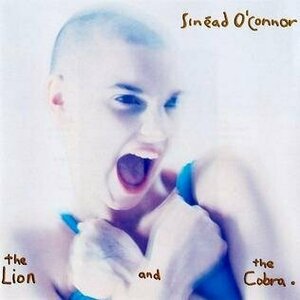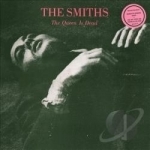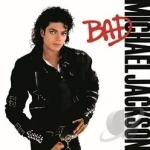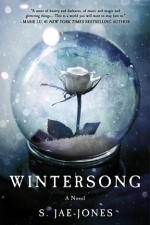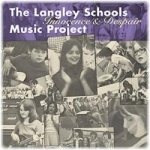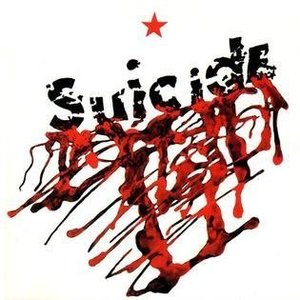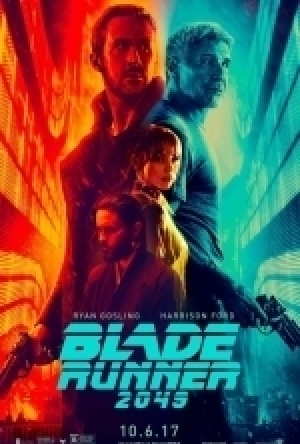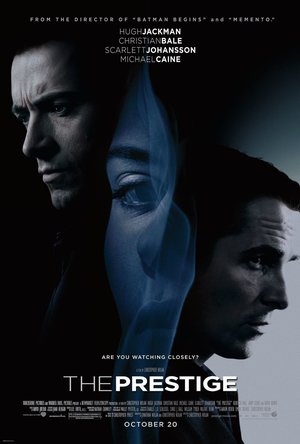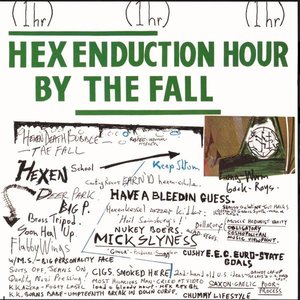Search
Search results
Shirley Manson recommended The Lion and the Cobra by Sinead O'Connor in Music (curated)
Brett Anderson recommended The Queen Is Dead by The Smiths in Music (curated)
Natasha Khan recommended Bad by Michael Jackson in Music (curated)
Goddess in the Stacks (553 KP) rated Wintersong in Books
Dec 27, 2018
So I knew this was inspired by Jim Henson's Labyrinth. That's partially why I picked it up, as I love that movie and David Bowie as the Goblin King. I didn't expect to get, basically, Labyrinth fanfiction. That was my first impression. As the book carries on, though, and especially as you get into the second book, it's more like a musician's fever-dream of their favorite childhood movie. There are so many elements taken from the movie, but they are deconstructed and put back together in such unexpected ways.
You'll recognize a line or two from the movie. The fairies still bite. The Goblin King is still beautiful and angular and strange. Liesl's after a stolen sibling. But Liesl and her family live in rural, probably 18th century Bavaria. She is not a spoiled, baby-sitting half-sister. Her grandmother has taught her the old stories, and unbeknownst to her, she's played music for The Goblin King her entire childhood.
The first book concerns Liesl's first foray into the Underground to save her sister when The Goblin King steals her to be his bride. This is where the acid trip starts. If you're familiar with Labyrinth, remember the ballroom scene? With people whirling about and appearing and disappearing and mirrors and the sense of disorientation as it all falls apart? Yeah, that's basically the entire time in the Underground. Though there is a ball scene, and it is especially trippy.
While Liesl manages to save her sister (that's a spoiler, but it isn't much of one), she has a harder time saving herself. Whether she actually does or not could be debated.
The second book of the duology, Shadowsong, has an interesting author's note in the front of it. The author first gives a content warning for self-harm, suicidal ideations, addiction, and reckless behaviors. She goes on to say Liesl has bipolar disorder, and further, that so does she. (The author.) She says Wintersong was her bright mirror, and Shadowsong her dark one. I can see that. Wintersong is a much happier book than Shadowsong, but the story would be incomplete without both books. Wintersong does end in a satisfactory conclusion, but Shadowsong just completes the tale in a way that I, at least, really enjoyed.
Shadowsong also contains more throwbacks to the movie - she falls and is caught by goblin hands; goblins form a giant face that talks to her about the old laws. These things don't happen in the same scene, though.
I loved the elements of music woven throughout the story; Liesl is a composer, and music - her music - is almost a character in its own right. It's definitely a huge plot element. It's in her connection to her brother, and her connection to The Goblin King. It's her way into the Underground, and her way out, and her way to reach back in.
It's an enchanting duology; I don't know if it would be as good for someone who didn't love Labyrinth the way I do. If you dislike the movie, I would probably advise against reading these. But if you like it or have simply never seen it, these would be good, atmospheric books to read in the dead of winter.
You can read all my reviews at http://goddessinthestacks.com
You'll recognize a line or two from the movie. The fairies still bite. The Goblin King is still beautiful and angular and strange. Liesl's after a stolen sibling. But Liesl and her family live in rural, probably 18th century Bavaria. She is not a spoiled, baby-sitting half-sister. Her grandmother has taught her the old stories, and unbeknownst to her, she's played music for The Goblin King her entire childhood.
The first book concerns Liesl's first foray into the Underground to save her sister when The Goblin King steals her to be his bride. This is where the acid trip starts. If you're familiar with Labyrinth, remember the ballroom scene? With people whirling about and appearing and disappearing and mirrors and the sense of disorientation as it all falls apart? Yeah, that's basically the entire time in the Underground. Though there is a ball scene, and it is especially trippy.
While Liesl manages to save her sister (that's a spoiler, but it isn't much of one), she has a harder time saving herself. Whether she actually does or not could be debated.
The second book of the duology, Shadowsong, has an interesting author's note in the front of it. The author first gives a content warning for self-harm, suicidal ideations, addiction, and reckless behaviors. She goes on to say Liesl has bipolar disorder, and further, that so does she. (The author.) She says Wintersong was her bright mirror, and Shadowsong her dark one. I can see that. Wintersong is a much happier book than Shadowsong, but the story would be incomplete without both books. Wintersong does end in a satisfactory conclusion, but Shadowsong just completes the tale in a way that I, at least, really enjoyed.
Shadowsong also contains more throwbacks to the movie - she falls and is caught by goblin hands; goblins form a giant face that talks to her about the old laws. These things don't happen in the same scene, though.
I loved the elements of music woven throughout the story; Liesl is a composer, and music - her music - is almost a character in its own right. It's definitely a huge plot element. It's in her connection to her brother, and her connection to The Goblin King. It's her way into the Underground, and her way out, and her way to reach back in.
It's an enchanting duology; I don't know if it would be as good for someone who didn't love Labyrinth the way I do. If you dislike the movie, I would probably advise against reading these. But if you like it or have simply never seen it, these would be good, atmospheric books to read in the dead of winter.
You can read all my reviews at http://goddessinthestacks.com
Goddess in the Stacks (553 KP) rated Shadowsong (Wintersong #2) in Books
Dec 27, 2018
So I knew this was inspired by Jim Henson's Labyrinth. That's partially why I picked it up, as I love that movie and David Bowie as the Goblin King. I didn't expect to get, basically, Labyrinth fanfiction. That was my first impression. As the book carries on, though, and especially as you get into the second book, it's more like a musician's fever-dream of their favorite childhood movie. There are so many elements taken from the movie, but they are deconstructed and put back together in such unexpected ways.
You'll recognize a line or two from the movie. The fairies still bite. The Goblin King is still beautiful and angular and strange. Liesl's after a stolen sibling. But Liesl and her family live in rural, probably 18th century Bavaria. She is not a spoiled, baby-sitting half-sister. Her grandmother has taught her the old stories, and unbeknownst to her, she's played music for The Goblin King her entire childhood.
The first book concerns Liesl's first foray into the Underground to save her sister when The Goblin King steals her to be his bride. This is where the acid trip starts. If you're familiar with Labyrinth, remember the ballroom scene? With people whirling about and appearing and disappearing and mirrors and the sense of disorientation as it all falls apart? Yeah, that's basically the entire time in the Underground. Though there is a ball scene, and it is especially trippy.
While Liesl manages to save her sister (that's a spoiler, but it isn't much of one), she has a harder time saving herself. Whether she actually does or not could be debated.
The second book of the duology, Shadowsong, has an interesting author's note in the front of it. The author first gives a content warning for self-harm, suicidal ideations, addiction, and reckless behaviors. She goes on to say Liesl has bipolar disorder, and further, that so does she. (The author.) She says Wintersong was her bright mirror, and Shadowsong her dark one. I can see that. Wintersong is a much happier book than Shadowsong, but the story would be incomplete without both books. Wintersong does end in a satisfactory conclusion, but Shadowsong just completes the tale in a way that I, at least, really enjoyed.
Shadowsong also contains more throwbacks to the movie - she falls and is caught by goblin hands; goblins form a giant face that talks to her about the old laws. These things don't happen in the same scene, though.
I loved the elements of music woven throughout the story; Liesl is a composer, and music - her music - is almost a character in its own right. It's definitely a huge plot element. It's in her connection to her brother, and her connection to The Goblin King. It's her way into the Underground, and her way out, and her way to reach back in.
It's an enchanting duology; I don't know if it would be as good for someone who didn't love Labyrinth the way I do. If you dislike the movie, I would probably advise against reading these. But if you like it or have simply never seen it, these would be good, atmospheric books to read in the dead of winter.
You can read all my reviews at http://goddessinthestacks.com
You'll recognize a line or two from the movie. The fairies still bite. The Goblin King is still beautiful and angular and strange. Liesl's after a stolen sibling. But Liesl and her family live in rural, probably 18th century Bavaria. She is not a spoiled, baby-sitting half-sister. Her grandmother has taught her the old stories, and unbeknownst to her, she's played music for The Goblin King her entire childhood.
The first book concerns Liesl's first foray into the Underground to save her sister when The Goblin King steals her to be his bride. This is where the acid trip starts. If you're familiar with Labyrinth, remember the ballroom scene? With people whirling about and appearing and disappearing and mirrors and the sense of disorientation as it all falls apart? Yeah, that's basically the entire time in the Underground. Though there is a ball scene, and it is especially trippy.
While Liesl manages to save her sister (that's a spoiler, but it isn't much of one), she has a harder time saving herself. Whether she actually does or not could be debated.
The second book of the duology, Shadowsong, has an interesting author's note in the front of it. The author first gives a content warning for self-harm, suicidal ideations, addiction, and reckless behaviors. She goes on to say Liesl has bipolar disorder, and further, that so does she. (The author.) She says Wintersong was her bright mirror, and Shadowsong her dark one. I can see that. Wintersong is a much happier book than Shadowsong, but the story would be incomplete without both books. Wintersong does end in a satisfactory conclusion, but Shadowsong just completes the tale in a way that I, at least, really enjoyed.
Shadowsong also contains more throwbacks to the movie - she falls and is caught by goblin hands; goblins form a giant face that talks to her about the old laws. These things don't happen in the same scene, though.
I loved the elements of music woven throughout the story; Liesl is a composer, and music - her music - is almost a character in its own right. It's definitely a huge plot element. It's in her connection to her brother, and her connection to The Goblin King. It's her way into the Underground, and her way out, and her way to reach back in.
It's an enchanting duology; I don't know if it would be as good for someone who didn't love Labyrinth the way I do. If you dislike the movie, I would probably advise against reading these. But if you like it or have simply never seen it, these would be good, atmospheric books to read in the dead of winter.
You can read all my reviews at http://goddessinthestacks.com
Natasha Khan recommended Innocence & Despair by The Langley Schools Music Project in Music (curated)
Daniel Boyd (1066 KP) rated Blade Runner 2049 (2017) in Movies
Oct 9, 2017 (Updated Oct 13, 2017)
One of the most visually stunning movies I have ever seen. (8 more)
Awesome production design.
Brilliant direction.
Beautiful cinematography.
Solid performances.
Incredible SFX.
Great score.
Good use of lighting.
Well written script and dialogue.
Villeneuve Strikes Gold Yet Again
Wow, this movie is a feast for your eyeballs. I won't go on about the visuals too much, as I'm sure that you have already heard how good looking this movie is, all I'll say is this; the movie deserves to be seen in the biggest screen possible. What is even better though, is unlike a Zack Snyder film, Blade Runner 2049 has more to it than just surface level, pretty visuals.
Somehow, Denis Villeneuve has achieved the impossible. He has directed a movie every year for the last five years and they have all been absolutely incredible, also he has managed to pull off a fantastic sequel to a 35 year old classic.
I loved almost every part of this movie. The direction was masterful to watch, with the movie being moved along at a deliberate, purposeful pace, rather than rushing through from action scene to action scene. The sets in this were out of this world, some props were really cool to look at and the use of mostly practical backdrops made a huge difference as opposed to using an abundance of green screen. Rodger Deakins' cinematography was astonishing, you could honestly screen grab an image from any time stamp in this movie and it would work perfectly as a beautiful desktop background.
I also thought that the performances were fantastic and everyone did a great job. Although Ford doesn't appear until the movie's third act, when he does he is great. Gosling commands his leading man role as we've come to expect him to. Robin Wright and Dave Bautista were the other standouts for me in terms of their performances.
The more technical elements of the movie worked perfectly in tandem with the story being told as well. The special effects were beautifully implemented and the lighting in the movie added a whole other layer of visual depth as well. The score also worked for the tone that the movie was aiming to achieve. The script was also solid and tightly woven.
The only thing I will say is; if you are going into the film expecting a sci-fi action blockbuster, you will come out disappointed. This is a slow paced, sci-fi noir, detective story. There are a few sparse moments of action and it does feel impactful when it occurs, but it is not the focus of the movie at all.
The one small element that bothered me was Jared Leto's performance. He took me out of the movie and was the only cast member who didn't feel like a real character within this world. Maybe I'm just being biased, as Jared Leto has always annoyed me in general, but for me he was the one bad part of this near masterpiece. Thankfully he doesn't get that much screen time, so it could have been worse. Also, the fact that David Bowie was originally cast in that role adds an extra sprinkle of salt in the wound.
Unfortunately, much like the original movie, this hasn't done great at the box office on its opening weekend. If like me, you are sick of mindless sequel cash cows that are total garbage such as Jurassic World, go and see this movie and vote with your wallet. If you don't, we are telling Hollywood that as a collective, we don't want sequels with depth and integrity, we want dumb, rushed, forgettable nonsense and that is what we will end up getting. Support this movie for the betterment of filmmaking and cinema, even if you haven't seen the original.
Overall I loved the movie, but I can see why people are finding it divisive. For me though, the vast majority of this movie's parts were absolutely fantastic and come together to form a journey that you must experience for yourself.
Somehow, Denis Villeneuve has achieved the impossible. He has directed a movie every year for the last five years and they have all been absolutely incredible, also he has managed to pull off a fantastic sequel to a 35 year old classic.
I loved almost every part of this movie. The direction was masterful to watch, with the movie being moved along at a deliberate, purposeful pace, rather than rushing through from action scene to action scene. The sets in this were out of this world, some props were really cool to look at and the use of mostly practical backdrops made a huge difference as opposed to using an abundance of green screen. Rodger Deakins' cinematography was astonishing, you could honestly screen grab an image from any time stamp in this movie and it would work perfectly as a beautiful desktop background.
I also thought that the performances were fantastic and everyone did a great job. Although Ford doesn't appear until the movie's third act, when he does he is great. Gosling commands his leading man role as we've come to expect him to. Robin Wright and Dave Bautista were the other standouts for me in terms of their performances.
The more technical elements of the movie worked perfectly in tandem with the story being told as well. The special effects were beautifully implemented and the lighting in the movie added a whole other layer of visual depth as well. The score also worked for the tone that the movie was aiming to achieve. The script was also solid and tightly woven.
The only thing I will say is; if you are going into the film expecting a sci-fi action blockbuster, you will come out disappointed. This is a slow paced, sci-fi noir, detective story. There are a few sparse moments of action and it does feel impactful when it occurs, but it is not the focus of the movie at all.
The one small element that bothered me was Jared Leto's performance. He took me out of the movie and was the only cast member who didn't feel like a real character within this world. Maybe I'm just being biased, as Jared Leto has always annoyed me in general, but for me he was the one bad part of this near masterpiece. Thankfully he doesn't get that much screen time, so it could have been worse. Also, the fact that David Bowie was originally cast in that role adds an extra sprinkle of salt in the wound.
Unfortunately, much like the original movie, this hasn't done great at the box office on its opening weekend. If like me, you are sick of mindless sequel cash cows that are total garbage such as Jurassic World, go and see this movie and vote with your wallet. If you don't, we are telling Hollywood that as a collective, we don't want sequels with depth and integrity, we want dumb, rushed, forgettable nonsense and that is what we will end up getting. Support this movie for the betterment of filmmaking and cinema, even if you haven't seen the original.
Overall I loved the movie, but I can see why people are finding it divisive. For me though, the vast majority of this movie's parts were absolutely fantastic and come together to form a journey that you must experience for yourself.
Sarah (7800 KP) rated The Prestige (2006) in Movies
Jan 9, 2021
Criminally underrated
Film #10 on the 100 Movies Bucket List: The Prestige
The Prestige is one of 3 Christopher Nolan films on this bucket list (the others being Memento and The Dark Knight), and probably the one that has least recognition out of the the three. In fact I’d say it’s criminally underrated. It focuses on two rival magicians in Victorian London, Robert Angier (Hugh Jackman) and Alfred Borden (Christian Bale), as a tragic accident gives rise to a bitter escalating feud. Supporting are Michael Caine as stage magic designer and engineer Cutter, Scarlett Johansson as magician’s assistant Olivia, Rebecca Hall as Borden’s wife Sarah and a brief appearance from Andy Serkis and the great David Bowie as Nikola Tesla and his assistant.
From the very start, The Prestige asks us the age old magician’s phrase “Are you watching closely?” and is very much a hint at events to come, warning us that we should be paying attention. And with this being a Christopher Nolan film, this shouldn’t be a surprise. The Prestige starts at the end, with an intriguing image of dozens of discarded top hats explaining magic tricks and the meaning behind the film’s title, and is followed by the death of one of the main characters and subsequent incarceration of another. It continues in typical Nolan style, jumping between the prison, Angier’s journey to visit Nikola Tesla and telling the story of both magicians and their feud from the very beginning. A tad confusing at times, but it wouldn’t be a Nolan film with a some time travelling story telling.
Magic isn’t probably something that appeals as much now as it did back when this film is set. Victorian London is a perfect setting at a time when magic was very much a fascination and a popular form of entertainment, and the costumes and set design for this period are very well done and in keeping with the dark and dreary setting. Yet strangely despite this, The Prestige never feels like a run of the mill period drama. The cast too are perfect for their roles and also help to make magic a lot more appealing. Christian Bale’s cockney Borden is exactly what you’d expect from him yet couldn’t imagine anyone else playing the role, especially with such an awkward verging on unlikeable character, and it’s refreshing to see Hugh Jackman play a part where he isn’t a completely nice or likeable person. And of course it wouldn’t be a Christopher Nolan film without Michael Caine, who brings some much needed humour and exposition. The only drag is unfortunately Scarlett Johansson, whose dodgy English accent pulls us away from anything she puts into her performance.
The Prestige is a slow burn murder mystery, that almost feels like a gothic horror at times with some sci-fi aspects thrown in. The plot has a vast amount of twists and turns and you really do have to be watching closely to understand it all and the ending itself and the final twist is probably the most polarising of them all. For me, the first time I watched this I never saw this twist coming. It truly shocked me, despite the many nods the film gives to the twist throughout. Watching this back now years later, I have to admit that the twist is actually a little predictable when you really think about it. But the feeling of astonishment I had watching this for the first time was second to none. What is most strange though, is that the most confusing thing in this entire film isn’t the twists and turns, it’s the fact that both Angier and Norden can dress up in ridiculously fake disguises to fool each other and ruin the tricks. This does spoil things a little.
I’ve always loved magic and grew up watching many magic shows on TV when I was younger. For me Nolan has brought back that love and appeal of magic, with a hugely entertaining and captivating story. It may not be perfect and the ending may lose some of it’s shine after the first watch, but it’s still another brilliant film from Christopher Nolan.
The Prestige is one of 3 Christopher Nolan films on this bucket list (the others being Memento and The Dark Knight), and probably the one that has least recognition out of the the three. In fact I’d say it’s criminally underrated. It focuses on two rival magicians in Victorian London, Robert Angier (Hugh Jackman) and Alfred Borden (Christian Bale), as a tragic accident gives rise to a bitter escalating feud. Supporting are Michael Caine as stage magic designer and engineer Cutter, Scarlett Johansson as magician’s assistant Olivia, Rebecca Hall as Borden’s wife Sarah and a brief appearance from Andy Serkis and the great David Bowie as Nikola Tesla and his assistant.
From the very start, The Prestige asks us the age old magician’s phrase “Are you watching closely?” and is very much a hint at events to come, warning us that we should be paying attention. And with this being a Christopher Nolan film, this shouldn’t be a surprise. The Prestige starts at the end, with an intriguing image of dozens of discarded top hats explaining magic tricks and the meaning behind the film’s title, and is followed by the death of one of the main characters and subsequent incarceration of another. It continues in typical Nolan style, jumping between the prison, Angier’s journey to visit Nikola Tesla and telling the story of both magicians and their feud from the very beginning. A tad confusing at times, but it wouldn’t be a Nolan film with a some time travelling story telling.
Magic isn’t probably something that appeals as much now as it did back when this film is set. Victorian London is a perfect setting at a time when magic was very much a fascination and a popular form of entertainment, and the costumes and set design for this period are very well done and in keeping with the dark and dreary setting. Yet strangely despite this, The Prestige never feels like a run of the mill period drama. The cast too are perfect for their roles and also help to make magic a lot more appealing. Christian Bale’s cockney Borden is exactly what you’d expect from him yet couldn’t imagine anyone else playing the role, especially with such an awkward verging on unlikeable character, and it’s refreshing to see Hugh Jackman play a part where he isn’t a completely nice or likeable person. And of course it wouldn’t be a Christopher Nolan film without Michael Caine, who brings some much needed humour and exposition. The only drag is unfortunately Scarlett Johansson, whose dodgy English accent pulls us away from anything she puts into her performance.
The Prestige is a slow burn murder mystery, that almost feels like a gothic horror at times with some sci-fi aspects thrown in. The plot has a vast amount of twists and turns and you really do have to be watching closely to understand it all and the ending itself and the final twist is probably the most polarising of them all. For me, the first time I watched this I never saw this twist coming. It truly shocked me, despite the many nods the film gives to the twist throughout. Watching this back now years later, I have to admit that the twist is actually a little predictable when you really think about it. But the feeling of astonishment I had watching this for the first time was second to none. What is most strange though, is that the most confusing thing in this entire film isn’t the twists and turns, it’s the fact that both Angier and Norden can dress up in ridiculously fake disguises to fool each other and ruin the tricks. This does spoil things a little.
I’ve always loved magic and grew up watching many magic shows on TV when I was younger. For me Nolan has brought back that love and appeal of magic, with a hugely entertaining and captivating story. It may not be perfect and the ending may lose some of it’s shine after the first watch, but it’s still another brilliant film from Christopher Nolan.
